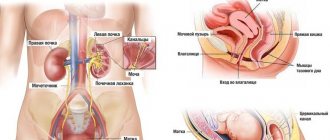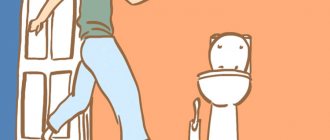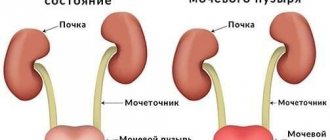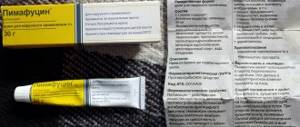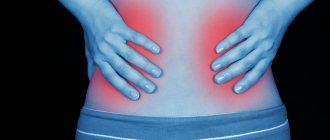Women are quite rightly called the weaker sex. After all, even in the fight against illnesses, ladies are less protected than men. This happens, for example, in the case of diseases of the genitourinary system. The body of the fair half of humanity is designed in such a way that infection penetrates into it much easier and faster. Therefore, pain and cramps when urinating in women are quite common and can be a symptom of a serious pathology.
It is better not to fight bacteria and inflammatory processes on your own. At home, you will not be able to find out the root cause of the unpleasant sensations, and, therefore, choose the necessary treatment method. Therefore, the best and only correct option is to go to the doctor. Especially when it comes to intimate health.
Pain when urinating in women
The fair half of humanity can suffer for a long period from terrible sensations when going to the toilet. Seeing a doctor occurs when the disease is already advanced, because pain during urination is considered a sign of some kind of disease.
There are many diseases that can be accompanied by this symptom. Of course, in most cases infectious factors play a major role.
Experts distinguish 4 subgroups:
- Rising . The entry of bacteria into the interior occurs from the bottom to the top and most often occurs due to hygiene problems.
- Infection through the circulatory system , and then the microbes end up in other organs.
- Descending. The patient gets sick from top to bottom, that is, the source of inflammation is the kidneys.
- Through the lymphatic system . In this situation, infection occurs through the reproductive system through the lymphatic vessels.
Factors predisposing to pain when urinating
Discomfort from the urinary system occurs in women when it is a favorable time for the development and reproduction of various pathological microorganisms.
This clinical picture can be contributed to by problems with the immune system, hypothermia, stress, overwork, and nutritional problems. The list can be endless, because there are a lot of factors that have a detrimental effect on the urinary system.
Cystitis
The most important reason for severe pain when emptying the bladder is considered to be its inflammation.
Features of the anatomical structure provoke the occurrence of genitourinary diseases in women. Since the urethra is distinguished by its short length, it is through it that infections enter the body.
In addition to the fact that going to the toilet becomes a real challenge, the patient will feel constant pain in the lower abdomen and an excessively frequent urge to go to the toilet. At the same time, the more urine comes out, the more pain is felt.
Doctors prohibit people who suffer from this disease from visiting the bathhouse. Also, after emptying your bladder, you should immediately take care of intimate hygiene. It is better to use special gentle products.
Pyelonephritis
The development of the disease is provoked by renal colic, which occurs on a regular basis.
Also, the disease can worsen due to infection in the ureter. The symptoms of pyelonephritis are nonspecific; the patient experiences pain in the occipital or temporal part of the head, the urge to vomit, and painful spasms in the side.
The treatment process involves taking antibiotics and drugs aimed at strengthening the immune system.
Kidney dysfunction
Problems with urination can arise not only due to infectious causes. There are other factors that cause pain when going to the toilet.
Eg:
- Renal colic. The condition is not considered an independent disease; rather, it is a consequence of the presence of tumors in the kidneys, pyelonephritis, or mechanical effects on this organ. With the described pathology, patients are characterized by the presence of an acute pain syndrome in the lumbar region and discomfort when emptying the bladder. As soon as the patient feels the symptoms of renal colic, it is necessary to adhere to bed rest, apply a warm compress to the lumbar region and go to the toilet regularly. If the attacks are repeated or last for a long period of time, you need to call the ambulance service.
- Passage of stones or fine sand through the urinary canal. The pathological condition occurs when the patient has a history of urolithiasis. In addition to the fact that the patient has severe pain along the path of the stones, he feels nauseous and may experience severe spasms in the lumbar region.
Urethritis
The disease is characterized by the presence of an extensive inflammatory process, which is localized on the mucous part of the urethra.
The disease occurs after suffering from hypothermia, against the background of problems with the immune system, in the presence of sexually transmitted diseases, injuries to the urethra or cystitis. Sometimes it can appear after the first sexual intercourse.
The main symptom of urethritis is severe cutting pain when emptying the bladder. In this case, the process is intermittent and is accompanied by severe burning and constant itching. If you examine the external genital organs, areas of inflamed tissue are visualized on them.
During therapeutic therapy, specialists instruct patients to limit physical activity. Also, sexual intercourse and alcohol consumption are not recommended.
Vaginitis
This problem is inflammatory in nature, which causes pain when urinating.
For what reason can the disease arise:
- the presence of infectious diseases in patients that can be transmitted after sexual intercourse;
- with poor and irregular hygiene of intimate areas;
- after trauma to the genital organs;
- due to endocrine diseases;
- due to problems with immunity;
- after hormonal imbalances.
Patients experience a discharge with a distinct, pungent odor, and a burning and itching sensation in the genital area. It is possible that during sexual intercourse there will be pain due to severe inflammation. Patients often go to the toilet, but the amount of urine is minimal.
Allergic reactions
Patients may respond to various antibacterial drugs, powders or intimate hygiene products. A reaction to chemical irritants is most often the cause of inflammation in the vagina.
Modern manufacturers have a huge number of products that help fight bacteria. But with their regular use, a severe allergy to some components is possible.
Women's skin in the intimate area can react to pads with fragrances, toilet paper, laundry detergent, and vaginal-type contraceptives.
Sexual infections
Diseases that are transmitted through sexual contact provoke inflammation not only of the external and internal genital organs, but also of the urethra. Sexually transmitted problems are characterized by burning and redness in the vagina and perineum. Provided that the localization of the disease has spread to the urethra, pain is noted when urinating.
Chlamydia
The cause of the disease is considered to be chlamydia; these microorganisms are not viruses or bacteria.
The course of the disease almost always occurs without pronounced symptoms or with minor manifestations. Characteristic signs are pain in the lower abdomen, a slight increase in overall body temperature, discharge with pus and mucus, and a burning sensation when urinating.
Gonorrhea
The insidiousness of the disease is that it can negatively affect other systems and organs. Symptoms are pronounced and can be noted at the first manifestation. Patients experience unpleasant discharge on their underwear, discomfort in the genital area, and pain when urinating and defecating.
Trichomoniasis
The primary manifestation of the disease is vaginal discharge with a strong odor.
Further, you can note the manifestation of redness on the genitals, itching and burning.
Signs may vary depending on the location of the infection.
If the vagina is affected, there may be no pain when urinating.
Ureaplasmosis
Inflammation in this disease occurs due to ureaplasma bacteria. It is noted that during labor it is possible for a child to become infected from his mother.
Often there are no symptoms of the disease; if certain factors are absent, such as pregnancy or problems with the immune system, then ureaplasmosis manifests itself as follows:
- pain when going to the toilet;
- discomfort during sexual intercourse;
- pulling sensations in the lower abdomen;
- discharge from the vaginal cavity is colorless and odorless.
Provided that the localization of the inflammatory process becomes larger, the discharge acquires a yellowish tint and a pronounced odor.
What will happen if left untreated?
If a woman refuses treatment, pain complications and their consequences begin to appear, which can go into an acute or chronic phase, but in themselves represent a much more serious problem than it was before. The female urethra is physiologically wider and shorter than that of men. Any inflammation or infection quickly spreads to other organs that are located higher: the bladder, ovaries, kidneys and others.
Complications
Since pain during urination appears more often with sexually transmitted infections with impaired microflora, women almost always experience inflammation. Such changes affect the cervix and can develop into erosion.
Complications can be very serious, for example, erosions without treatment turn into cancer, and some viruses are completely oncogenic, including papilloma, and types 16 and 18 increase the risk of cervical cancer. Infectious inflammation leads to adhesions. In addition to direct complications, without treatment, inflammation or viruses spread to other internal organs, causing:
- perihepatitis;
- cholecystitis;
- appendicitis;
- peritonitis.
An urgent visit to a doctor is needed not only for regular pain, but also for fever and non-physiological discharge from the urethra.
Consequences
The most dangerous consequences are associated with the female reproductive system and pregnancy. The described complications lead to:
- infertility;
- ectopic pregnancy;
- unfavorable course of pregnancy with an increased risk of miscarriage, miscarriage or early birth;
- disruption of fetal development due to transmission of infection in utero;
- infection of the child during childbirth and serious pathologies in the future.
Pain and discomfort during the outflow of urine should raise suspicion in patients. If symptoms do not go away within several hours or days, then you should immediately consult a doctor.
Features of the pain symptom
Depending on the nature and type of unpleasant sensations that occur, the diagnosis depends. Discomfort when urinating indicates the development of complex diseases. If you do not take into account the nuances of symptom manifestation, there is a risk of misdiagnosis.
Pain with blood
If blood is detected in the urine, you should immediately consult a doctor, as this is hematuria. There are many reasons for the occurrence of such a symptom, sometimes it is a complex pathology, but often it is due to advanced cystitis.
What other factors provoke the manifestation of hematuria:
- problems with the urinary and reproductive systems;
- polycystic kidney disease;
- failure in the circulatory system of the urinary system;
- glomerulonephritis;
- malignant neoplasm in the kidneys;
- urolithiasis disease;
- pyelonephritis.
At the end of urination
What pain after emptying the bladder may indicate:
- neoplasms in the genitourinary system;
- problems with maintaining intimate hygiene rules;
- infectious diseases;
- colds;
- multiple inflammations in the pelvic area.
By the way, doctors are of the opinion that this symptom also occurs due to dietary habits. Excess acidic products, large consumption of carbonated drinks and energy drinks lead to unpleasant sensations after going to the toilet.
Pain can be caused by:
- sexually transmitted infections;
- problems with the uterus, congenital or acquired;
- anomalies of gynecological type.
At the beginning of urination
The painful syndrome can also be accompanied by other signs of a serious pathological process:
- itching, swelling and red spots on the outer labia;
- discharge from the vaginal cavity, strong odor from there;
- pain during sexual intercourse;
- frequent trips to the toilet.
It is noted that before emptying the bladder there may be significant pain in the lower abdomen. The complex of these symptoms should be a call to visit a specialist.
Burning in the vagina
If this symptom is present, we are talking about a relapse of the inflammatory process; it could be endometritis or adnexitis.
This phenomenon occurs due to problems with the vaginal microflora, as a result of hormonal imbalance. Also, this symptom is detected after hypothermia, with a weakened immune system, during periods of depression and while taking antibiotics.
It is noted that the main cause may be banal thrush. If it is present, infection with yeast fungi occurs.
The development of vulvitis often entails severe pain in the vagina. This disease refers to an inflammatory process, the occurrence of which is provoked by pathogenic microorganisms or sexually transmitted infections.
How is diagnostics carried out?
Successful treatment and, first of all, diagnosis largely depend on the underlying cause of the disease. Only a qualified doctor can identify it: a gynecologist, urologist or venereologist. One way or another, to begin with, the doctor “paints” a clinical picture for himself, studies the anamnesis, and then prescribes tests for subsequent laboratory research.
If pathologies of the urinary system occur, a woman must pass and undergo:
- urine analysis, vaginal microflora, including STIs;
- cystoscopy, ultrasound examination of the bladder, kidneys;
- tank culture of urine and vaginal microflora;
- tests to determine the level of leukocytes, ESR.
The source of pain in the bladder can be very dangerous pathogens. Therefore, it is possible that, in addition to a nephrologist, gynecologist and urologist, you will also have to visit a dermatovenerologist.
Pain when urinating and pregnancy
For women in an interesting position, such a sign is especially dangerous, because if there is an infection in the genitourinary system, there is a risk of harming the health of the fetus.
Also, it is impossible to carry out antibacterial therapy, but the success of treatment depends on it. Pregnant women are prohibited from almost all drugs on the list of drugs that can combat pathogenic bacteria.
When the main cause of the disease is the kidneys, observation and treatment should be carried out in a hospital. It does not matter whether the patient has symptoms such as high blood pressure, severe swelling and increased body temperature.
During the period of bearing a child, there is an increased load on the kidneys, urination is frequent and abundant, both day and night. Even a completely healthy organ cannot always cope with this load, but if there are pathologies, then problems are almost impossible to avoid.
Failures in kidney function can be detected by laboratory tests. The results will show isolated urinary syndrome. Leukocytes, red blood cells and protein appear in the urine.
The pathological process in the kidneys, which the patient had before pregnancy, contributes to the development of renal failure. In this case, there is a high risk of life for the mother and fetus.
Therapeutic therapy for pregnant women includes physical procedures that have a warming effect, accelerating the process of blood circulation in the area of inflammation. To avoid hidden forms of the disease, when carrying a baby, it is better to regularly undergo general tests. Fulfilling this condition will allow pathology to be detected at an early stage and safe measures to be taken.
Pain after childbirth
After labor, pain may occur if the woman had a caesarean section. Also, there is a possibility of discomfort if a catheter was used during natural childbirth. If it is installed correctly, there may be a slight burning sensation, but often the medical staff injures the urinary canal.
Causes of non-infectious pain:
- pathological problems of the genitourinary system, diagnosed earlier or arising after childbirth;
- relapses of chronic diseases of the urinary system;
- injuries caused during childbirth;
- mechanical damage (use of a catheter or other instruments);
- emotional or physical overload.
Mechanical damage
Mechanical damage to the urethra can include external exposure to a traumatic nature. Essentially, it's an injury.
The most common ones are:
- Pelvic fracture.
- Bruises due to falling with the perineum onto a hard surface or object.
- Punctures, cuts, lacerations.
- Gunshot wounds.
- Animal bite.
- Medical procedures (catheter management, bougienage, cystoscopy).
Symptoms:
- Acute pain and burning in the urethra.
- Blood in urine.
- Urohematoma.
- Swelling of the urethra.
Treatment
Therapeutic tactics must be selected by a specialist, taking into account all the individual characteristics of the patient. Usually, based on the diagnosis, you can create an excellent plan and the course will end with a positive result. Depending on the disease, this issue will be dealt with by a gynecologist, infectious disease specialist or urologist.
Medication method
Physiotherapy cannot be used to treat diseases that cause pain during bladder emptying. For a good effect, you will need several types of drugs that have a broad effect on the body.
Elements for therapeutic therapy:
- Antibacterial agents. The treatment lasts for 10 days; patients are usually prescribed Azithromycin or Ampicillin.
- Antiviral . It is strictly forbidden to omit these drugs; in the prescription it will be Anaferon or Viferon.
- Antifungal dosage forms . Time-tested Diflucan or Nystatin will cope well with the disease.
- NSAIDs. In some cases, the pain can be very severe and it is not recommended to endure it. Diclofenac or Nimesil will be an auxiliary agent.
- Sedatives. Since problems may be associated with an unstable psychological state, doctors recommend that patients take a course of Grandaxin.
- Antispasmodics. Again, only time-tested medications are Baralgin or Papaverine.
- Phytotherapy. Herbal infusions or teas, which should contain knotweed, horsetail and lingonberry leaves.
- Herbal medicines. Canephron or Phytolysin help well with severe pain.
- Immunomodulators. Affordable and inexpensive drugs are Polyoxidonium or Echinacea.
Azithromycin
Ampicillin
Diflucan
Candles
Dielofenac
Anaferon
Baralgin
Canephron
Phytolysin
Grandaxin
Nimesil
Polyoxidonium
Viferon
Echinacea
Once the acute symptoms have been eliminated, doctors prescribe physiotherapy to patients. It is noted that you should also limit your diet and remove spices, pickles and dishes with marinades from the menu. During treatment, you should give up sexual activity and try to rest more.
Treatment with folk remedies
In some cases, positive dynamics can be noted after therapy using herbs or decoctions. It is allowed to include prescriptions from alternative medicine in treatment after consultation with a specialist.
Top tips for treating pain when urinating:
- Lingonberry leaves. To prepare a healing decoction, you will need a tablespoon of raw materials and half a liter of warm, clean water. After filling the collection with liquid, you need to leave it for 30 minutes. After this, the medicinal solution is brought to a boil and boiled for about 15 minutes. After a period of time, the volume of the broth should decrease by 2 times. Cool the finished product and take a large spoon three times a day. It has been noticed that the best results from treatment with this decoction are observed with cystitis.
- Bear ears. To make a medicinal product, you need a spoon of the dried plant, which will be poured with a glass of boiling water. The container with the liquid is placed in a water bath and steamed for half an hour. The strained and cooled broth is topped up with cold, clean water so that the original volume is obtained. You need to drink 150 grams several times a day.
- Dill seeds. Pour a glass of boiling water into a thermos and add a teaspoon of dry seeds. After 15 minutes it is permissible to drink a healing infusion. This volume is enough for a day, for 3 doses. After a few days, the pain when urinating will significantly decrease.
- Cucumber seeds. It is best to grind the product in a mortar to a powder state. A couple of dessert spoons of raw materials are poured into a glass of warm boiled water. The liquid is boiled for about a quarter of an hour over low heat. Half an hour before meals, the strained broth is taken several times a day.
- Lettuce. The leaves of the plant are finely chopped and a few spoons are taken from the finished mass. Pour a glass of boiled water over the raw material, leave it for a couple of hours, and then filter it. Three times a day you need to drink a tablespoon of infusion.
Prevention
The easiest way to prevent a disease is to avoid suffering from its symptoms later. There are several measures to improve the functioning of the genitourinary system.
What to do to prevent painful urination:
- A sufficient amount of fluid must enter the human body every day. According to doctors, approximately 8 glasses of clean water is considered the norm.
- As soon as you feel the urge to go to the toilet, you need to immediately empty your bladder. After going to the toilet, it is advised to immediately perform hygiene of the external genitalia. If possible, wash with warm water.
- Underwear should be made of natural fabric; synthetics do not allow the skin to breathe. In principle, artificial fabrics and excessively tight underwear have a detrimental effect on women's health.
- After sexual intercourse is over, it is worth visiting the toilet and performing intimate hygiene.
- If therapeutic therapy does not give the desired result, then it is better not to take a bath, but to carry out water procedures using a shower.
- After washing, the genitals must be wiped or dried. For this purpose, use cotton towels or soft paper napkins.
- Flushing the ureter has a beneficial effect on the functioning of the ureter. Unsweetened teas, warm compote and still water are good for this purpose.
- Sometimes the process of emptying the bladder is too slow and painful, so it is worth helping the body. You can perform the process while in a bathtub with water.
Pain when urinating cannot be tolerated; when the first signs appear, you should visit a specialized doctor. Otherwise, there is a risk of developing a serious pathology in a chronic form.
Folk remedies
At home, treatment of pain that occurs in women when urinating can be done using folk remedies, but they should be in addition to the main therapy. If unpleasant symptoms appear, the patient should be provided with warm, plenty of fluids. Cranberry juice, rosehip decoctions, and herbal teas that have diuretic properties are very useful. The total volume of liquid per day is at least two liters.
It is also recommended to do douching. As a solution, you can use decoctions prepared from chamomile, St. John's wort and other medicinal herbs. They have excellent antibacterial properties, eliminate all unpleasant symptoms, and relieve pain.

